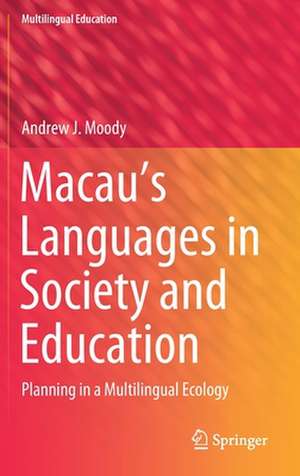Macau’s Languages in Society and Education: Planning in a Multilingual Ecology: Multilingual Education, cartea 39
Autor Andrew J. Moodyen Limba Engleză Hardback – 19 mar 2021
Din seria Multilingual Education
- 18%
 Preț: 902.36 lei
Preț: 902.36 lei - 18%
 Preț: 956.81 lei
Preț: 956.81 lei - 18%
 Preț: 953.65 lei
Preț: 953.65 lei - 18%
 Preț: 836.29 lei
Preț: 836.29 lei - 15%
 Preț: 638.24 lei
Preț: 638.24 lei - 20%
 Preț: 567.32 lei
Preț: 567.32 lei - 20%
 Preț: 566.75 lei
Preț: 566.75 lei - 20%
 Preț: 569.85 lei
Preț: 569.85 lei - 15%
 Preț: 649.87 lei
Preț: 649.87 lei - 15%
 Preț: 645.28 lei
Preț: 645.28 lei -
 Preț: 394.87 lei
Preț: 394.87 lei - 15%
 Preț: 643.84 lei
Preț: 643.84 lei - 15%
 Preț: 643.34 lei
Preț: 643.34 lei -
 Preț: 389.49 lei
Preț: 389.49 lei - 15%
 Preț: 704.36 lei
Preț: 704.36 lei - 20%
 Preț: 555.52 lei
Preț: 555.52 lei - 18%
 Preț: 953.65 lei
Preț: 953.65 lei - 18%
 Preț: 952.26 lei
Preț: 952.26 lei - 15%
 Preț: 646.43 lei
Preț: 646.43 lei - 15%
 Preț: 585.40 lei
Preț: 585.40 lei - 18%
 Preț: 787.15 lei
Preț: 787.15 lei - 18%
 Preț: 1009.22 lei
Preț: 1009.22 lei - 18%
 Preț: 948.92 lei
Preț: 948.92 lei - 15%
 Preț: 649.22 lei
Preț: 649.22 lei - 18%
 Preț: 1113.39 lei
Preț: 1113.39 lei - 15%
 Preț: 644.95 lei
Preț: 644.95 lei - 15%
 Preț: 634.68 lei
Preț: 634.68 lei - 15%
 Preț: 644.63 lei
Preț: 644.63 lei -
 Preț: 388.90 lei
Preț: 388.90 lei - 15%
 Preț: 647.27 lei
Preț: 647.27 lei - 15%
 Preț: 641.85 lei
Preț: 641.85 lei - 15%
 Preț: 635.80 lei
Preț: 635.80 lei
Preț: 786.84 lei
Preț vechi: 959.56 lei
-18% Nou
Puncte Express: 1180
Preț estimativ în valută:
150.56€ • 157.62$ • 124.58£
150.56€ • 157.62$ • 124.58£
Carte tipărită la comandă
Livrare economică 05-19 aprilie
Preluare comenzi: 021 569.72.76
Specificații
ISBN-13: 9783030682637
ISBN-10: 3030682633
Ilustrații: XXI, 265 p. 66 illus., 1 illus. in color.
Dimensiuni: 155 x 235 mm
Greutate: 0.58 kg
Ediția:1st ed. 2021
Editura: Springer International Publishing
Colecția Springer
Seria Multilingual Education
Locul publicării:Cham, Switzerland
ISBN-10: 3030682633
Ilustrații: XXI, 265 p. 66 illus., 1 illus. in color.
Dimensiuni: 155 x 235 mm
Greutate: 0.58 kg
Ediția:1st ed. 2021
Editura: Springer International Publishing
Colecția Springer
Seria Multilingual Education
Locul publicării:Cham, Switzerland
Cuprins
Chapter 1. The Sociolinguistics of Size: How Multilingualism in a Small Society Differs from a Large One.- Chapter 2. Historical Contexts of Multilingualism: Macau Languages (1500–1999).- Chapter 3. Recent Developments in Macau Multilingualism: Macau English and the Foundations of a Middle Class.- Chapter 4. Multilingualism and English in Primary and Early Childhood Education: Head Starts and Cram Schools.- Chapter 5. Multilingualism and English in Secondary Education: Language Policy and Pluralism.- Chapter 6. English and Chinese in Macau Tertiary Education: Global Trends and Local Responses.- Chapter 7. Future Status and Functions of Multilingualism in Macau: Language Planning in Education.- Chapter 8. Conclusion: Cultural and Linguistic Identities in Small Societies.
Textul de pe ultima copertă
This book examines the role of English within education and society in the quickly changing city of Macau. Macau’s multilingual language ecology offers the unique opportunity to examine language planning and policy issues within a small speech community. The languages within the ecology include several Chinese varieties, such as Cantonese, Putonghua and Hokkien, European languages like Portuguese and English, and a number of Asian languages that include, among others, Burmese, Filipino languages, Japanese, Timorese, etc. As the smallest city in South China's Pearl River Delta, Macau has sought to maintain cultural and linguistic independence from its larger neighbours, and independence has been built upon an historic commitment to multilingualism and cultural plurality. As economic development and globalisation offer new opportunities to a growing middle class, the sociolinguistics of a small society constrain and influence the language policies that the territory seeks to implement. Macau's multilingual and pluralistic response to language needs within the territory echoes historical responses to similar challenges and suggests that small communities function sociolinguistically in ways that differ from larger communities.
Caracteristici
Offers an up-to-date macro-sociolinguistic examination of English within the context of Macau multilingualism Documents the long tradition of Macau multilingualism as a defining feature of the community Demonstrates the importance of sociolinguistic analysis in small communities and argues that the pressures upon small communities are frequently overlooked Examines the role of English and multilingualism in the development of a middle-class community?
